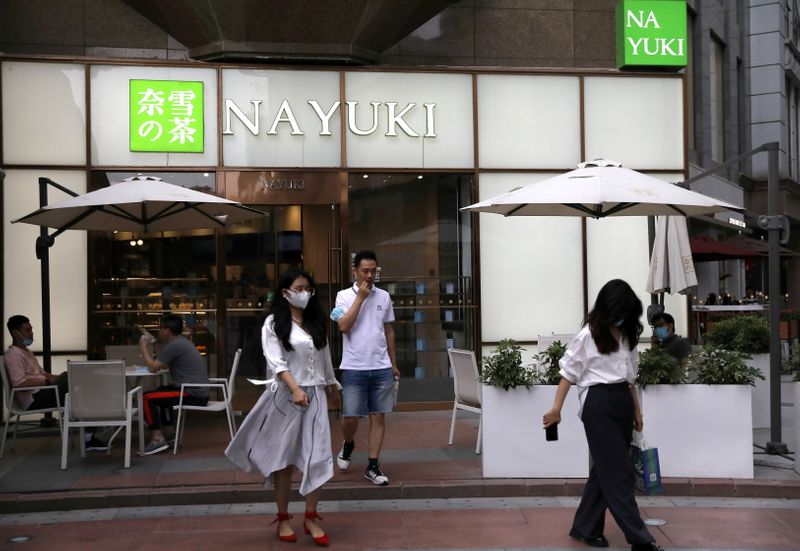By Sophie Yu and Kane Wu
BEIJING/HONG KONG (Reuters) - He Shuang, a student at a U.S. university stranded in her home city of Chongqing in southwest China during the pandemic, has added more than 300 domestic brands to her list of favourites on Alibaba (NYSE:BABA)'s Taobao online mall.
Like with He, Chinese brands are hot with most shoppers and have spurred billions of dollars in investment, as consumers increasingly make patriotic choices amid a growing backlash against foreign brands https://www.reuters.com/business/retail-consumer/chinese-apps-join-celebs-backlash-against-western-fashion-brands-over-xinjiang-2021-03-26 in the country.
A surge in online shopping after people were forced indoors due to COVID-19 last year, a recovery in the market since then, and infrastructure that allows vendors to scale up swiftly have also propelled demand for local brands.
"Once you try, you find the quality of local products is as good as foreign products," said the 19-year old He, who favours home-grown labels from Carslan eye shadows and Feiyue sneakers to Bestore Co snacks and Miniso homeware.
Maia Active, a Sequoia Capital-backed athleisure wear maker, said its products were designed based on body measurements of Asian women and, therefore, offered local customers a better fit and more comfort than western counterparts.
In lockstep with demand, investors too have been pouring funds into local consumer brands this year.
Chinese consumer firms raised 69.7 billion yuan ($11 billion) from primary market investors in the first five months, more than double the year-earlier amount, according to Cygnus Equity, a Chinese boutique investment bank.
"Beauty products, food and beverage brands are the most popular. Recently hotpot and ramen brands are particularly coveted," said Ming Jin, managing partner at Cygnus.
Up to 200 brands are currently seeking new capital from investors, bankers and investors said.
"China is the easiest market for building something from zero to a 100-million-yuan sales target," a private equity investor in tea chain operator Nayuki said, declining to be named as he was not authorised to speak to media.
Nayuki last week raised $656 million in a Hong Kong float, which gave it a valuation of $4.4 billion, more than double the level in a December funding round.
Weilong Delicious Global Holdings, whose flour-based spicy sticks sell for under 5 yuan per pack, raised 3.56 billion yuan in May from big name investors including Tencent (HK:0700), Jack Ma's Yunfeng Capital, CPE, Hillhouse Capital and Sequoia Capital China. The snack maker was valued at nearly 70 billion yuan.
Sequoia-backed Genki Forest, a soft drink brand seeking to challenge Coca Cola, said it was valued at $6 billion after an April fundraising, ten times more than 18 months earlier.
Its fundraising attracted investors such as Louis Vuitton owner LVMH (PA:LVMH)'s private equity arm and Singaporean state investor Temasek.
LOCAL VS GLOBAL
During JD.Com's online shopping festival this month, sales growth of Chinese brands was 4% higher than international brands. The growth in their customer numbers exceeded that of international brands by 16%, JD.com said.
Chris Mulliken, a Shanghai-based partner at consultancy EY, said nationalism was a factor driving the popularity of local brands, including pride in China's recovery from COVID-19 even as several other countries battle high infection rates.
"People are travelling (albeit domestically) and taking the opportunity to rediscover their own country, return to their customs and discover new Chinese brands," he said.
The recent Xinjiang cotton ban imposed by several global brands including H&M, Nike (NYSE:NKE) and Adidas (DE:ADSGN) over concerns about alleged rights abuses in the province, which offended many Chinese consumers, was another catalyst. China strongly denies the claims and says all labour in Xinjiang is consensual and contract-based.
Shares of domestic sportswear producers Xtep, Li Ning and Anta have risen 196%, 60% and 38% respectively since April.
Dealmakers have warned about the sharply higher valuations, while they also say the demand trend will stay for a long time.
"Consumers no longer idolize international, multinational brands. They like products and brands that speak for them," said Nina Gong, a Beijing-based managing director with private equity firm Carlyle Group (NASDAQ:CG).

($1 = 6.4525 Chinese yuan)
(This story has ben refiled to correct Nina Gong's location in the last paragraph to Beijing, not Shanghai)